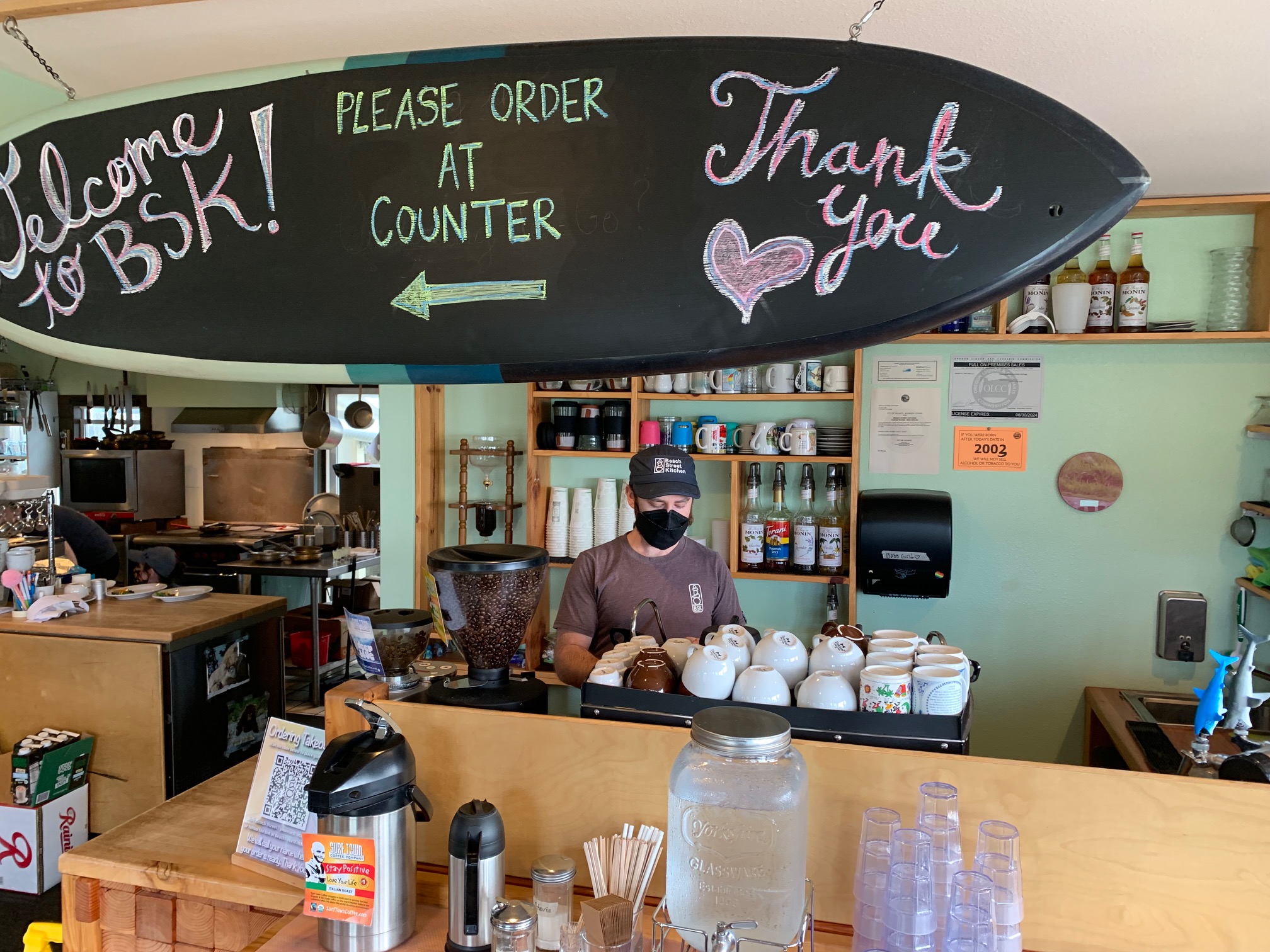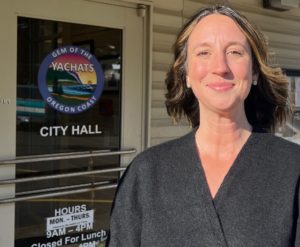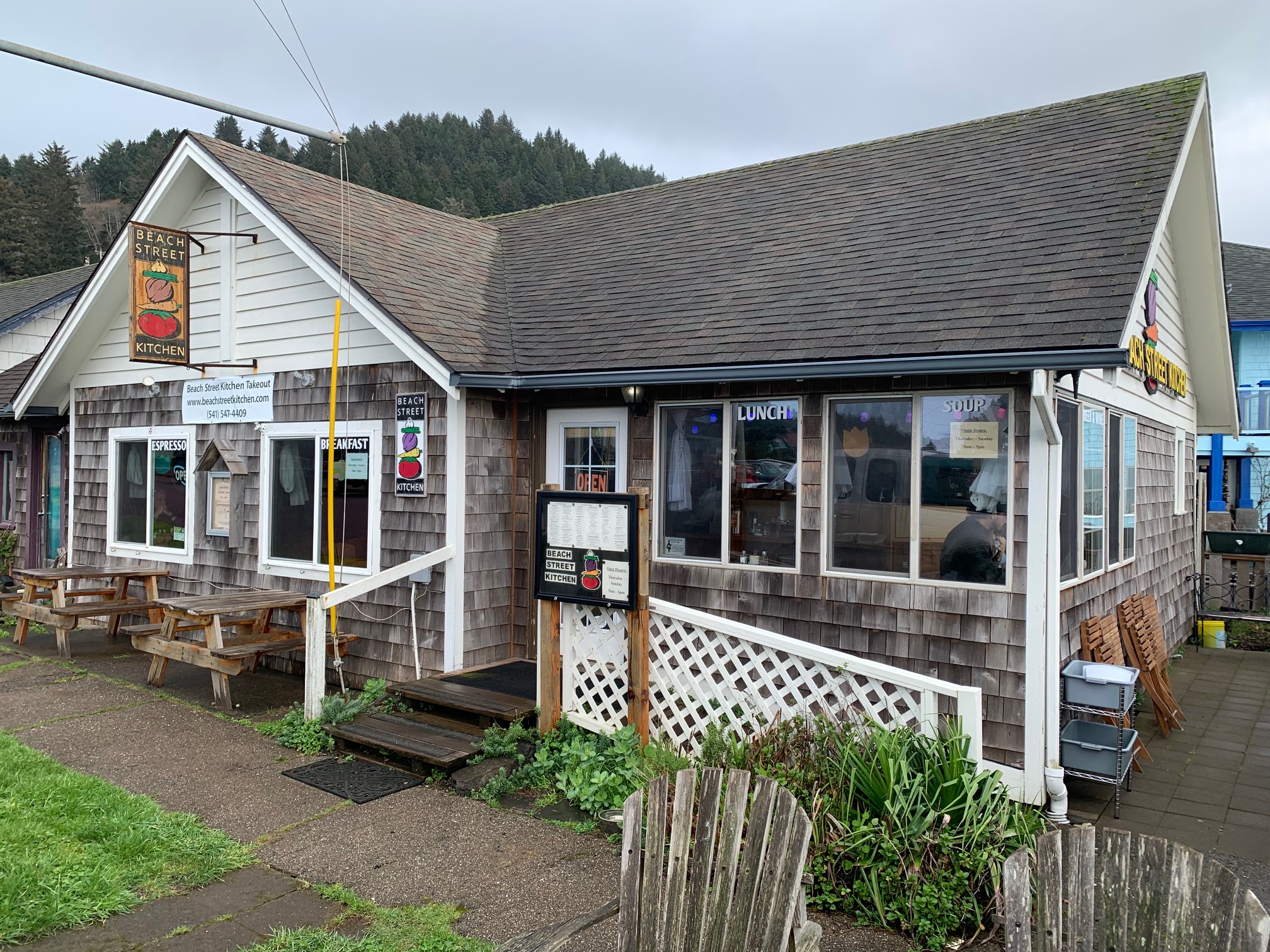
By GARRET JAROS/YachatsNews
YACHATS – The days of uncollected or overdue food and beverage taxes along with weaknesses in the administration of vacation rentals are over as the city of Yachats, under new management gets busy with the business of putting its house in order.
After learning at the December meeting of the city’s finance committee that thousands upon thousands of tax dollars are being left on the table because of neglect or missed opportunity, new city manager Bobbi Price and city staff leveled their collective sights on fixing it.
“I would like to thank you all for bringing this to my attention,” Price said by way of opening the topics at the finance committee’s meeting Tuesday.
City hall has been in a nearly constant state of flux because of a revolving door at the city manager position – with five short-term or interims in the past four years – which had a trickle-down effect on staff who shuffled positions to fill holes and cover duties not normally within their purview.
Price credited the last interim manager, Rick Sant, who filled the gap for nine months before Price was hired in October, for righting the ship and getting staff where they needed to be so that when the issue of derelict taxes was revealed, it was all hands on deck.

“We’ve been working really hard and really reading through the code and really diving into our tax collection process … and feel that we have really been able to address many of the concerns that were brought up,” Price said.
The backdrop for examining what money Yachats is collecting and what is slipping through its fingers is that the city council is considering raising the transient lodging tax from 9 percent to as much as 12 percent.
The tax is the city’s biggest source of revenue and brought in $1.4 million during the 2022-23 fiscal year. In November, voters approved the county raising its lodging tax in unincorporated areas from 10 to 12 percent. Newport, Lincoln City, Depoe Bay and Waldport are also at 12 percent.

Food and beverage tax
Yachats levies a 5 percent tax on prepared foods and beverages in the city, which 13 restaurants and groceries are supposed to pass on to the city in four annual payments. That money is used solely to pay off the loan on the city’s wastewater treatment plant.
In December, the finance committee reported that four restaurants collected the tax but failed to send the money to the city. The names of those businesses are not public record, but what was made public is that two had missed payments for nearly two years and the amount of tax not collected for all four was approximately $45,000.
But the uncollected taxes were only a small portion of what they owed after the city levied late fees.
The owner of Beach Street Kitchen, who stepped forward to explain to the city council why their taxes that totaled $5,100 over two years had not been made, now faced a bill of upwards of $40,000 with penalties.
Price and her staff made changes to include contacting the business owner by telephone, email and certified letter immediately after a payment is missed to ensure they are aware. But she also believes the penalties need to be reined in.
“I would like to have a recommendation that we could bring to city council to really look at the ordinance and the description of the penalties that’s being (applied) to the restaurants right now,” Price told the finance committee Tuesday. “It looks like we have a $100 late fee and then a 10 percent (penalty on the tax due) on 10 percent on 10 percent and we see that it gets to be quite astronomical quite fast.”
Price added that while she understands having a penalty and interest that has a “bite to it,” no one wants to run a business out of town.
“We want to make them successful,” Price said. “We want to work with them. The first step that will happen in our office is to not let it get to this point. Unfortunately, there has been a lot of turnover, a lot of movement of positions and it was let to get to this point …”
The finance committee agreed. As did at least one city councilor who contacted a committee member by phone to support Beach Street’s request to have the penalty portion of the money they owed waived and be allowed to set up a payment plan to pay off the unpaid tax.
The committee went on to make a formal recommendation that Beach Street’s penalties be waived and that it be allowed to make payments — with the caveat that if owners miss a payment, the penalties will be assessed.
Price said she will take the recommendation to city council, which has the final say in the matter.
Another committee recommendation is to move the self-reporting quarterly payments currently filed online to a paper copy that can be more easily tracked. It made the same recommendation for the reporting of vacation rental taxes.
In the meantime, there are now only two businesses left that have yet to catch up on their tax bill and both have been notified via calls, emails and certified letters.
Vacation rentals
At its December meeting the finance committee told Price the city was missing out on nearly $100,000 by not fully licensing the 125 vacation rentals allowed to operate in the city and that only 88 of the city’s rentals reported an income.
At that time there were 113 licensed rentals, leaving 12 licenses that could be issued to people on a waiting list. Also, 24 of the 113 reported no income in 2023 even if some are operating because their income is reported through a national third-party vacation rental company that does not share individual customer information but submits the payments in one lump sum. The city has no way of tracking those.
Price gave the committee an update on the status of vacation rental homes Tuesday and requested the committee recommend to the council a requirement that all homeowners report their revenue along with any income collected by national companies such as Home Away and Expedia.
There are now nine vacation rental licenses available but are in the process of being issued, she said. City staff also honed it down to 11 license holders who have reported no income three years in a row and are in the process of contacting them to ask why the licenses are inactive.
“That’s a significant amount of money that we are leaving on the table by allowing people to report zero each year,” Price said. “So that will come into how we decide to go forward with that. But I think it needs to be addressed one way or another.”
There is no requirement that licensed vacation homes earn an income – and whether that should remain the case is something the committee will pass on to city council.
Price concluded the meeting by saying she is confident issues raised in December are indeed getting squared away.
“I think we are heading in a good direction, really tightening things up, having the ordinances to match it and then having the internal procedures and protocols put in place inside city hall to ensure it’s all being followed through with,” she said. “I think we are on a really good forward movement trajectory.”
- Garret Jaros is YachatsNews’ full-time reporter and can be reached at GJaros@YachatsNews.com



The approach of the City Manager in the case of unpaid food and beverage taxes is wise and shows good judgment. Acknowledging the need for improvement in the city’s notification apparatus while striving to support businesses to pay up and do better from here onwards is a win -win for the city, its residents, visitors, and the local enterprises that enhance Yachats. It also indicates that Yachats frustrating drought of competent city management is ending, thanks to Rick Sant and Bobbi Price.
Totally agree, Dan. Thanks, Rick and Bobbi!
I’m from Eugene and have rented different short-term rentals here in Yachats annually for the last 5 or 6 years (yes, I’m on vacation here now!). Ya’ll have a gem. Keep raising tourist taxes on people like me. So many homeowners in your town are developing and transforming their properties into short-term rentals; it just makes sense to tax them and us “sometimes-citizens” a bit more. Higher fees to short-term rentals will amount to either more funds for the city, or more year-long residents in Yachats. A win win!
I love Yachats and have stayed there many times. I am concerned that prices for everything will make it impossible to stay there. I can’t afford to live there and now I can’ t afford to visit. Everyone is now catering to the wealthy.
Agreed. Let’s squeeze the sponge dry first, i.e., collect all the fees that are due under current tax and fee schedules. If additional funds are needed after Yachats has received all monies due, then we should consider whether a tax increase is merited. Let’s do our best to make eating and lodging here as accessible as possible for working class people. TBH, the costs of both have risen to the point that it is increasingly difficult for non-wealthy people to enjoy these aspects of the coastal experience. Theres a social cost in raising prices too high. Lodging and restaurant taxes are a part of that balance.